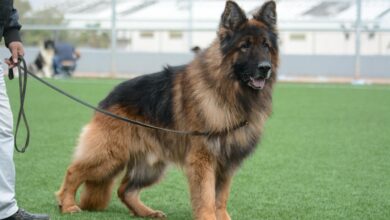
Recall training, or teaching your pet to come when called, is a foundational skill for pet owners. Whether you have a dog, a cat, or another type of pet, teaching recall is vital for their safety and your peace of mind. In this comprehensive guide, we will delve into the nuances of recall training, offering valuable tips and techniques to help you successfully teach your pet this essential command.
Teaching Recall
Recall training is the process of instructing your pet to return to you when you use a specific cue or command, such as “come” or “here.” This skill is not only convenient but also potentially life-saving in situations where your pet’s safety is at risk.
The Basics of Recall Training
- Start Indoors: Initiate your recall training in a quiet indoor space where your pet feels comfortable. Use a cheerful tone and enticing rewards, such as treats or toys, to motivate them to come to you when you call their name.
- Use a Leash or Long Line: For dogs and some other pets, utilizing a leash or a long training line during initial sessions ensures they cannot ignore your command and wander off. Gradually, you can increase the distance between you and your pet.
- Consistency is Key: Always employ the same recall command and make it clear and distinct. If you opt for “come,” adhere to it and steer clear of variations like “come here” or “over here.”
- Positive Reinforcement: Reward your pet generously with treats, praise, or their favorite toy when they respond correctly to your recall command. Make the experience enjoyable so that they associate coming to you with positive outcomes.
- Avoid Punishment: Never scold or punish your pet if they do not immediately respond to your recall command. This can create a negative association and diminish their willingness to come when called.
Recall Training for Different Pets
1. Recall Training for Dogs
Dogs are often the primary candidates for recall training due to their sociable nature and outdoor activities. Effective recall allows them to be safely off-leash in suitable environments. To train your dog for recall, adhere to the steps outlined above and gradually practice in environments with increasing distractions.
2. Recall Training for Cats
Contrary to popular belief, cats can indeed learn to come when called. Although they are typically more independent, recall training can be highly advantageous. Start indoors using their favorite treats or toys as rewards. Be patient, as cats may require more time to master this command compared to dogs.
3. Recall Training for Other Pets
Recall training is valuable for a variety of other pets, including rabbits, ferrets, and birds. The fundamental principles are akin to training dogs and involve consistency, positive reinforcement, and gradual exposure to distractions.
Advanced Recall Training
Once your pet has mastered the basics of recall, you can advance to more challenging training scenarios. This may involve practicing in progressively distracting environments or introducing various distractions to test their response. Advanced recall training solidifies their ability to come when called even in demanding situations.
Troubleshooting Recall Challenges
If your pet encounters difficulties with recall, consider implementing the following tips:
- Practice Patience: Training is a gradual process, and some pets may require more time to grasp the concept.
- Enhance Motivation: Employ higher-value rewards, such as particularly tasty treats or their most cherished toys, to incentivize your pet to respond to your command.
- Reduce Distances: If your pet consistently disregards your command, lessen the physical gap between you during training sessions.
- Professional Assistance: In cases where recall training proves exceptionally challenging, it might be prudent to seek the expertise of a professional pet trainer.
Remember, recall training is an ongoing endeavor. Regular practice and reinforcement of the command are essential to maintain a reliable recall response from your pet. Teaching your pet to come when called not only enhances their safety but also strengthens the bond between you and your beloved companion.








